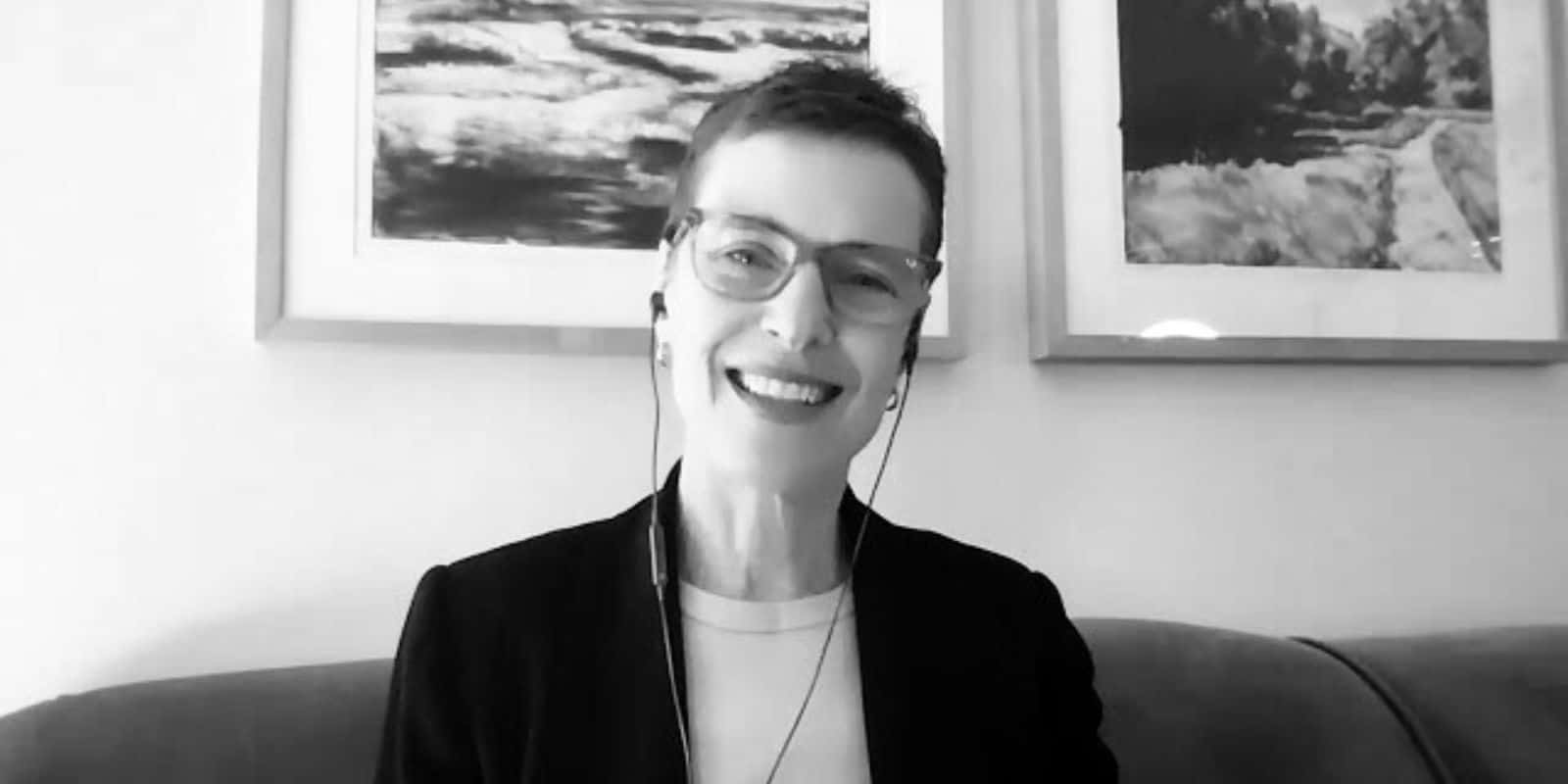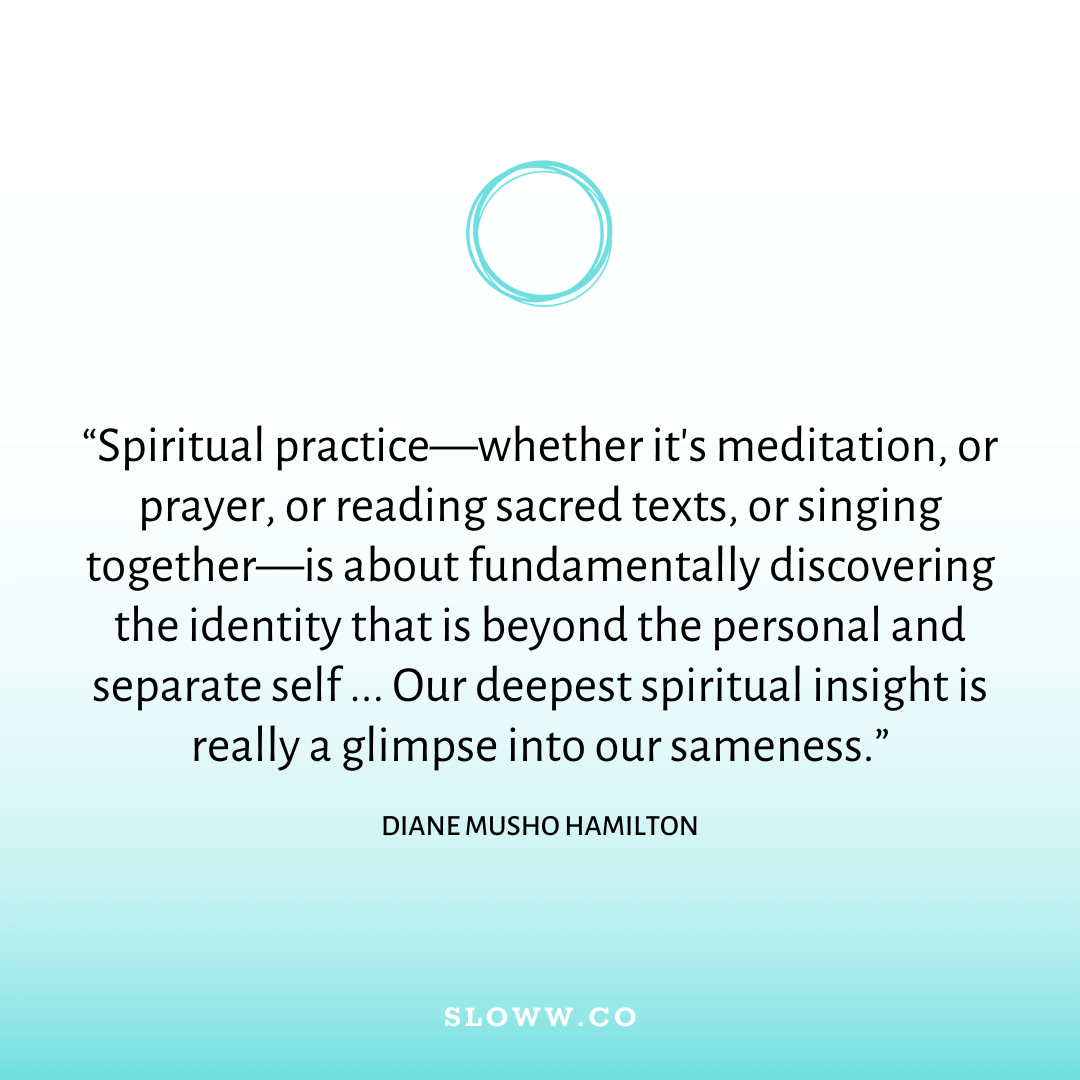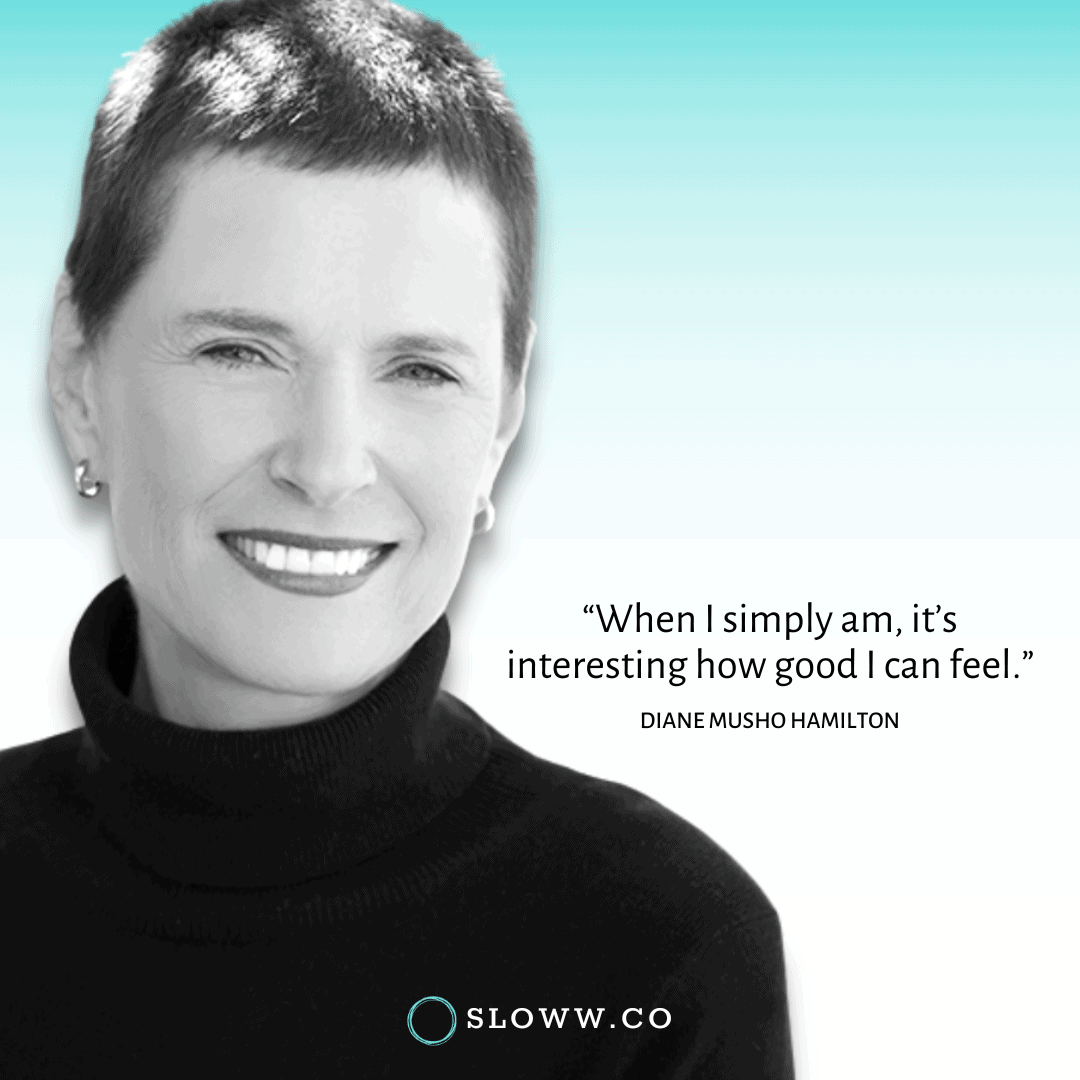This page lists some of the all-time best Diane Musho Hamilton quotes. Enjoy!
Page Contents:
- Meditation & Mediation Quotes
- Sameness & Difference Quotes
- Awareness & Attention Quotes
- Conflict & Regulation Quotes
- Perspectives & Selves Quotes

50+ Diane Musho Hamilton Quotes on Meditation, Mediation, Conflict, & More
Diane Musho Hamilton Quotes on Meditation & Mediation
“I’m a mediator, and I’m a meditator. It’s taken me until probably 10 years ago to realize that fundamentally they’re the same thing … ‘Meditate’ and ‘mediate’ both literally mean ‘to bring two into one.’” — Diane Musho Hamilton
“Mediation and meditation really have a lot to do with deepening our experience of our inherent unity, and then using differences as a way for us to grow because the universe evolves through this alteration between sameness and difference.” — Diane Musho Hamilton
“As a mediator, I’ll work with a group of people who, for whatever reason, disagree—or maybe they’re having a particular kind of conflict, or maybe they’re having a contract dispute—but what’s front and center in their awareness is not the way in which they’re the same, but the way in which they’re different.” — Diane Musho Hamilton
“Mediation is about bringing two differing points of view—or two different sets of interests, or a conflict in which there are many parties—into one solution.” — Diane Musho Hamilton
“With meditation, when you sit down on the cushion, you’re bringing your body, speech, and mind into one moment and creating coherence with your life. So, you could say meditation is a way of becoming one with your life.” — Diane Musho Hamilton
“When we meditate, we literally bring our attention into the here and now so that our body, our breath, our mind, and the expanse of our environment become one—and then we practice just learning to stay present and available to things as they are. This practice of sitting still, of being awake, is really a practice in discovering our fundamental sameness.” — Diane Musho Hamilton
“Meditation is one of the great ways that we have of navigating our interior and heightening the discipline, if you will, of how we perceive.” — Diane Musho Hamilton
“As contemplatives—as meditators, as people who are just generally committed to becoming more aware—there’s a tremendous amount of our attention that’s being paid to well-being, and to human resilience, and how to actually work with some of the neurophysiology in our body in order to help us become the kind of awake, kind, and available human beings that we want to be.” — Diane Musho Hamilton
“Spiritual practice—whether it’s meditation, or prayer, or reading sacred texts, or singing together—is about fundamentally discovering the identity that is beyond the personal and separate self … Our deepest spiritual insight is really a glimpse into our sameness.” — Diane Musho Hamilton
Diane Musho Hamilton Quotes on Sameness & Difference
“The Buddha had been on a very extensive spiritual search for about six years, and there was a point at which he was looking for a quality of mind that was unconditioned, that was utterly reliable, in which the body and mind became completely peaceful. In order for that to occur, in a way, the experience of difference is relaxed, and one opens to whatever is arising. Without judgment and without a need for things to be different, there’s a sense of a deepening, and a coherence, and a coming into a quality of unity.” — Diane Musho Hamilton
“We’re deeply the same in our aspiration of what it is we want fundamentally: to be happy and for the world to be fair.” — Diane Musho Hamilton
“When I simply am, it’s interesting how good I can feel.” — Diane Musho Hamilton
“We are by our very nature deeply at home where we are. When we’re awake, and when we’re available to what is, and when we trust that we belong fundamentally, we’re not separate from others and we’re not separate from any life forms. The wisdom that comes from that is life-changing.” — Diane Musho Hamilton
“Everything is okay as it is. There’s a deep recognition that feeling that level of peace and serenity is actually our birthright. It’s actually the case that we are fundamentally at home where we are.” — Diane Musho Hamilton
“Individual autonomy is essential to collective intelligence … I see collective intelligence as the capacity of a group, regardless of size, to function optimally, and holistically, and compassionately for the well-being of the whole.” — Diane Musho Hamilton
“Usually what you find in high states of coherence is the mind is empty, available, present—and listening is happening easily and spontaneously … Coherence is really important to human efficiency, but differentiation and struggle is important to human creativity.” — Diane Musho Hamilton
“As soon as differences can emerge and people can find out how to work with them, they trust each other more … Without deeper levels of sameness—of bonding, of trust, of belonging—it’s very difficult to explore our differences in a way that’s optimal.” — Diane Musho Hamilton
“Our differences are always connected to our fundamental commonality … The way we work with difference has everything to do with discovering the underlying commonality … Difference is exciting, and potentially there’s growth and possibility, but if you can’t find enough commonality, it becomes stressful and then it becomes threatening.” — Diane Musho Hamilton
“We don’t grow as human beings without encountering differences.” — Diane Musho Hamilton
“Difference catches our attention—it excites us, it wakes us up—and sameness in a certain way allows us to let down.” — Diane Musho Hamilton
“Whatever this difference is, whatever its importance to me, there’s room for it to be explored, there’s room for its legitimacy.” — Diane Musho Hamilton
“When we turn towards the difference and open to it, that creative tension is almost inevitably filled with a kind of learning.” — Diane Musho Hamilton
“Difference can become extremely life-giving when we use it skillfully.” — Diane Musho Hamilton
Diane Musho Hamilton Quotes on Awareness & Attention
“Awareness is like an open, wide-angle lens. When you narrow the lens and focus on something in particular and become attentive to that thing, that’s mindfulness. So, we’re both mindful and aware.” — Diane Musho Hamilton
“To the extent that we’re telling a story, cognition is preoccupied with that story, and our awareness cannot be extended as openly as it would otherwise.” — Diane Musho Hamilton
“We can’t change a pattern that we aren’t aware of … We can’t change a pattern that we can’t see.” — Diane Musho Hamilton
“Mindfulness is paying attention to paying attention. We’re not simply paying attention, but we’re aware that we’re paying attention. We can take a perspective on the perspective we’re taking.” — Diane Musho Hamilton
“Mindfulness refers to paying attention to anything that arises within this open field of awareness … Mindfulness is the ability to notice what is in my awareness, what objects are in awareness.” — Diane Musho Hamilton
“When we cease paying attention to the object, and we actually start to pay attention to awareness itself—we become aware of awareness—we notice a certain kind of increase in our well-being.” — Diane Musho Hamilton
“When we turn attention inward, there’s a lightness that sets in. And, the deeper we go with that, the more we report an experience of innate well-being that’s not dependent on all the objects of our attention.” — Diane Musho Hamilton
“We have this remarkable capacity to pay attention, and paying attention is, in some ways, one of our greatest freedoms.” — Diane Musho Hamilton
“We have this incredible freedom to notice and to pay attention, and we have an even more radical and powerful capacity to notice what it is we’re noticing. And, when we start to notice what it is we’re noticing, we become interested in that which is paying attention. So, not only do I notice the objects of my attention, but I start to notice that I am paying attention—and then I get interested in that capacity, and I start to identify with my awareness.” — Diane Musho Hamilton
“Qualities of well-being start to arise when I identify as awareness—when I’m not bound up by the coming and going of objects in my mind … Identify with awareness, and be awareness itself … Attention shifts from the object to the subject.” — Diane Musho Hamilton
“When I start to become aware of awareness itself, something deep and substantial shifts in my experience.” — Diane Musho Hamilton
“We have this amazing volition in terms of where we put attention.” — Diane Musho Hamilton
Diane Musho Hamilton Quotes on Conflict & Regulation
“By learning how to regulate our own body, we can stay present to the difference, we can overcome the sensations of threat, and we can explore and learn from the difference.” — Diane Musho Hamilton
“I think that working with the body is the first thing.” — Diane Musho Hamilton
“If you have two coexisting truths in your head at any one time, you literally have to deal with the disruption in your body.” — Diane Musho Hamilton
“When those sensations build up in the body and our defensive systems start to be activated, we actually are not able to learn.” — Diane Musho Hamilton
“Commit to experiencing the sensation. Stop the thoughts. Experience the sensation. Literally receive them. Get to know them.” — Diane Musho Hamilton
“In the domain of communication, listening skills soothe the nervous system … Listening is the golden communication skill for soothing the room, for bringing your own nervous system and other people’s nervous systems into coherence.” — Diane Musho Hamilton
“When we genuinely want to hear what someone else has to say, we have to set aside our own thoughts, we have to let our own thoughts go—we become present in the moment, and we become receptive.” — Diane Musho Hamilton
“Never ever confuse listening with agreement … You can give someone a very profound experience of hearing them out without agreeing at all with what it is they’re saying.” — Diane Musho Hamilton
“Conflict is an embodied experience … Within a conflict situation, neurobiology drives a lot of what happens … The thing I pay the most attention to is what’s happening in our bodies when I’m working with conflict.” — Diane Musho Hamilton
“Conflict is, by its nature, threatening to the status quo.” — Diane Musho Hamilton
“When human beings go to war with each other, one of the first things we do is dehumanize the enemy. Because the enemy has to become ‘not me’. If it’s not me, then I can abuse you, I can kill you, I can destroy you. But, as soon as you’re like me, I no longer can do that.” — Diane Musho Hamilton
4 Cues to Self-Regulate (when the encounter with difference is setting you off):
- Cognitive: Remind yourself mentally that everything is okay.
- Embodied: Feel the weight of your body. Feel every place in your body where you can sense gravity.
- Breathing: Identify with the breath. The breath harmonizes body and mind.
- Noticing: Notice the mind and the agitation of your thoughts and just see if you can feel something like space—in the mind and in the room. Experience space both on the inside, or the interior of my experience, and the exterior of my experience.
Diane Musho Hamilton Quotes on Perspectives & Selves
“We all know that there are certain developmental tasks that get accomplished at certain ages (in children). But, the same is true of adults. We also can expand and grow our perspectives.” — Diane Musho Hamilton
“I suddenly started to see that perspective-taking was developmental … I started to see that there were limits to capacity. And the capacity that I started to notice was the capacity to take perspectives … What I was seeing was just a whole range of people who had different capacity to take different points of view.” — Diane Musho Hamilton
“I don’t just assume that everybody’s capacity is the same. I assume that there are differences in capacity and that I have to take that into account … It is not a given that everyone in the room can hold two perspectives in their body-mind at the same time without an overabundance of chaos and tension.” — Diane Musho Hamilton
“Perspective taking, and the capacity to take perspectives, changes the heart of negotiation at such a fundamental level.” — Diane Musho Hamilton
“Some people actually have a difficult time taking their own perspective … Some people literally couldn’t take their own point of view … Then you have people who could take their own point of view, but couldn’t take the point of view of the other.” — Diane Musho Hamilton
“There was a much smaller group of people who not only could they hold one, two, perhaps three, they could hold four, five, six perspectives at once. They could take a perspective on the process. They could think about how the process had evolved from the past and where it might go in the future. They could think about what the impact of the facilitator was on the process.” — Diane Musho Hamilton
4 Developing Senses of Self:
- Egocentric self: Ego development, developing an ego, is absolutely not only natural but necessary. It’s a localized experience. There tends to be a lot of stress, a lot of emphasis on survival, accomplishment, being seen. The ego isn’t bad/wrong; the ego is simply limited, tends to suffer, and is oriented toward self-sustaining. But, there is such a thing as a healthy ego. There’s a healthy ecosystem of self which is permeable and which can take inputs and give out inputs. And, then the perspective can shift to include more. An ego becomes bad when an ego is exclusive. The ego does create division in the mind because, where there’s a narrative, that narrative is separating us from our immediate experience. In order to maintain an identity, there are things that I have to keep out of it. A healthy ego is one that has permeability and is able to drop its reference points and expand awareness. Wherever there’s an egocentric self, there’s a sense of the other, so there’s self and other. One of the conditions that we want to pay attention to whenever we’re identifying as the ego is that there’s a sense of separation—and because there’s a sense of separation, there’s stress.
- Ethnocentric self: We’re going to grow our perspectives from the self to the group. I’m now concerned with my group, my family, my nation, the people I belong to, the people I feel at home with. The ethnocentric self feels safe in my group, but your group can sometimes feel threatening to me. There’s a set of virtues and values. The values are the ones of the people, my tribe, the people I belonged with. At the egocentric level, there’s self and other; at the ethnocentric level, there’s us and them. The boundary around what’s ‘me’ and what’s ‘not me’ at ethnocentric is strong. I’m willing to sacrifice my life for my clan or my group. The egocentric self suffers, the ethnocentric self goes to war. It’s much more dangerous for human beings to identify with this which is why we disown it.
- World-centric self: If you can cross the barrier of ‘us and them’, you’re already established at what we would call a world-centric level of development. In the same way the ego is too small, then all of a sudden, so is my ethnocentric identity. At ethnocentric, difference is threatening. At world-centric, difference is embraced. My capacity to identify with all of humanity and to really enjoy and appreciate the differences is fully online. I become a member of humanity. I really feel like I belong, and I also feel that the pain of the world is mine. National boundaries dissolve. I start to see the beauty of the ecosystems and caring about the species on the planet. We see a global community. Rather than being threatened by difference, we’re interested in it.
- Cosmic-centric self: Cosmic-centric transcends and includes world-centric, healthy ethnocentrism, and healthy egocentric. Where is that boundary of identity? You’re limitless. I can’t quite identify the boundaries of space or time. Identity itself has dissolved, and when identity itself dissolves, I’m completely open. And, I’m relaxed in a way that’s really fundamental. I feel really at home. I’m completely in the here and now, my awareness is wide open, there’s no sense of limit. There’s nothing that is beyond what I am, so I’m simply embedded in the breadth of all things. Paradox is my reality. It’s all one. It’s the same. There’s a beauty that starts to emerge. I can be available to the world-centric domain, I can be available to my family and the ethnocentric, and I can continue to work with my own consciousness. Your compassion is large enough to actually handle what you’re doing because it’s not yours.
You May Also Enjoy:
- Browse all Quote Posts






